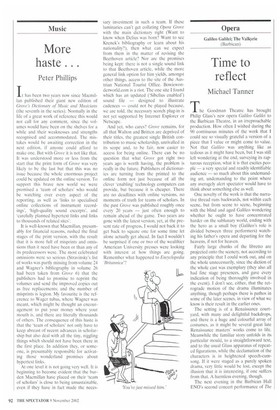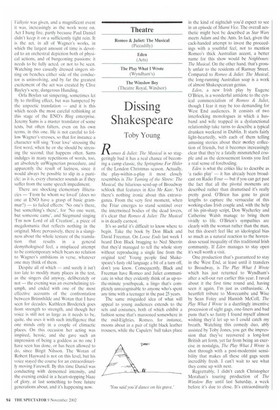Time to reflect
Michael Tanner
The Goodman Theatre has brought Philip Glass's new opera Galileo Galilei to the Barbican Theatre, in an irreproachable production. How often I wished during the 90 continuous minutes of the work that I could see so visually grateful a version of a piece that I value or might come to value. Not that Galileo was anything like as tedious as it might have been. but I was still left wondering at the end, surveying its rapturous reception, what it is that excites people — a very special and readily identifiable audience — so much about this undemanding art, undemanding to the point where any averagely alert spectator would have to think about something else as well.
One novelty of the work is that the narrative thread runs backwards, not within each scene, but from scene to scene, beginning with the blind and aged Galileo wondering whether he ought to have concentrated harder on the sublunary world, ending with the hero as a small boy (Galileo's role is divided between three performers) watching his father's opera and departing for the heavens, if not for heaven.
Fairly large chunks of the libretto are projected onto the scenery, not according to any principle that I could work out, and on the whole unnecessarily, since the diction of the whole cast was exemplary (they also all had fine stage presences, and gave every indication of being thoroughly involved in the event). I don't see, either, that the retrograde motion of the drama illuminates anything, though perhaps there is pathos in some of the later scenes, in view of what we know is their result in the earlier ones.
The setting is of a Renaissance courtyard, with many and delightful backdrops, and there is a huge and colourful array of costumes, as it might be several great late Renaissance masters' works come to life. Meanwhile the familiar story unfolds in its particular mould, to a straightforward text, and to the usual Glass apparatus of repeated figurations, while the declamation of the characters is in heightened speech-cumsong. If it were staged as a purely spoken drama, very little would be lost, except the illusion that it is interesting, if one suffers from that. A harmless evening, though.
The next evening in the Barbican Hall ENO's second concert performance of The Valkyrie was given, and a magnificent event it was, increasingly as the work wore on. Act I hung fire, partly because Paul Daniel didn't keep it on a sufficiently tight rein. It is the act, in all of Wagner's works, in which the largest amount of time is devoted to an orchestral depiction both of physical actions, and of burgeoning passions: it needs to be fully acted, or not to be seen. Watching two casually dressed singers sitting on benches either side of the conductor is uninvolving, and by far the greatest excitement of the act was created by Clive Bayley's sexy, dangerous Hunding.
Orla Boylan sat simpering, sometimes let fly to thrilling effect, but was hampered by the unpoetic translation — and it is this which needs the most careful rethinking at this stage of the ENO's Ring enterprise. Jeremy Sams is a master translator of some texts, but often falters, even on his own terms, in this one. He is not careful to follow Wagner's stresses, so that for instance a character will sing 'Your love' stressing the first word, when he or she should be stressing the second; that happens often. Sams indulges in many repetitions of words, too, an absolutely unWagnerian procedure, and apparently the result of laziness, since it would always be possible to slip in a particle; as it is, every character sounds as if they suffer from the same speech impediment There are shocking elementary illiteracies — From he whom we loved' (does no one at ENO have a grasp of basic grammar?) — to failed effects: No one's there, but something's there', for 'No one went, but someone came', and Siegmund singing 'I'm now Lord of all Creation', a piece of megalomania that reflects nothing in the original. More pervasively, there is a slanginess about the whole texture of the translation that results in a general demythologised feel, a misplaced attempt to be contemporary which bears no relation to Wagner's ambitions in verse, whatever one may think of them.
Despite all of which — and surely it isn't too late to modify many places in the text, as the singers did anyway, deliberately or not — the evening was an overwhelming triumph, and ended with one of the most effective accounts of the confrontation between Briinnhilde and Wotan that I have seen for decades. Kathleen Broderick goes from strength to strength, and though her voice is still not as large as it needs to be, quite, she uses it with such intelligence that one minds only in a couple of climactic places. On this occasion her acting was inspired, heroic, and she gave such an impression of being a goddess as no one I have seen has done, or has been allowed to do, since Birgit Nilsson. The Wotan of Robert Hayward is not on this level, but his voice stayed the course for an extraordinarily moving Farewell. By this time Daniel was conducting with demented intensity, and the evening ended in a heart-stopping blaze of glory, at last something to bore future generations about, and it's happening now.



















































































































 Previous page
Previous page